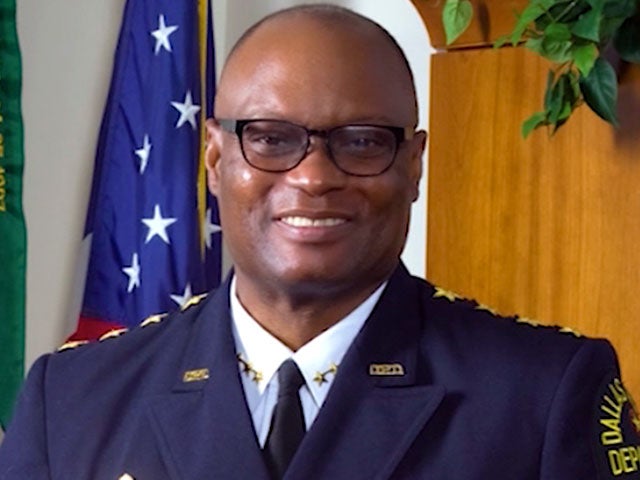On the Front Lines of Social Change
DALLAS SHOOTINGS
On July 7, 2016 a planned, peaceful, Black Lives Matter protest took place in Dallas. Protest organizers had met with police prior to the protest to give information about the plans for the event. At 7 p.m., the planned time, a crowd of about 800 gathered at Belo Garden, a park in the town center. The event went as planned. As the protest wound down, Chief David went home. A little after 9 p.m., just as he was about to go bed, his cell phone rang. He learned that Micah Johnson, a twenty-five year old African American Army veteran had parked a black SUV on a street and joined the crowd of protesters. He was shooting police officers.
During the ambush, Chief David stayed in contact with the mayor, the city manager, and council members. At the same time, he gave instructions to police on the scene. He also conducted press conferences to keep the public abreast of the situation. He and his commander used a high tech robot strapped with an explosive to take Johnson out. Chief David and his team were successful in ending the killings and restoring the city to order. In total, Johnson shot and killed 5 officers and wounded 9 others.
BORN TO BE A POLICEMAN
Chief David grew up in Oak Cliff, a borough of Dallas, Texas. His neighborhood was poor, but it was filled with people he loved. He lived with his mother, Norma Jean, and his two brothers, Rickey Charles and Kelvin. His mother was a devout Christian and he accepted Christ at an early age. His father lived in and out of the house, and was sometimes gone for years at a time. Chief David graduated in 1979 from Oak Cliff High school. He was voted both “most intellectual” and “most likely to succeed.” After graduating, he studied at the University of Texas. However, he saw that the state of his neighborhood had begun deteriorating with the introduction of crack. Gun violence was on the rise and his mother and his brothers had to navigate the dangerous streets daily. Concerned about the state of the city, Chief David left college and joined the Dallas Police force in 1983 as a patrol officer. Since he was policing in the same neighborhood he grew up in, many called him an “Uncle Tom.” Nevertheless, he moved up the ranks and became very successful. He worked in patrol divisions, SWAT, and internal affairs. He became first assistant chief of police in 2005. In 2007–08, he served as assistant city manager. He was appointed police chief in April 2010 and sworn into office on May 4, 2010. He retired in October, 2016.
During his time on the force, he learned several lessons. One of the most important principles he learned was to police from his heart. “There was a transition between how I came into policing in the 80’s and how I police now,” he said. In the 80’s, you put them all in jail and let God sort them out. There was no sorting between low-level offenders, mentally ill, etc. I saw the criminal on the street as someone who needed to be locked up without any question that that was what needed to happen. I had no compassion for those who needed to come to jail. Over time, I became convicted because that isn’t what my faith teaches. Everyone deserves a measure of respect and compassion. Now I police with the knowledge that it is the message of faith that transforms lives. We have a Savior that can save. Society is safer when we focus on people more than rules, regulations and laws that don’t consider the effect on people.”
He hopes people will follow his lead. After the Dallas shootings, he admonished the crowd of protesters to “Put your protest sign down and put in an application,” essentially encouraging them to join the police force. Although he acknowledges that protesting has its place, he says, “A significant thing you can do is serve other people.” When he became a cop to help his decaying neighborhood, it was one of the most rewarding things he has ever done, and he hopes others will do the same.
ONE TRAGEDY AFTER ANOTHER
Chief David faced several difficult situations during his time on the force, but he says it was his faith that carried him through them. In 1988, his partner Walter was killed while responding to a domestic violence incident. “When I lost Walter, it was the first time I stared frailty in the face, and what I saw shook me to my core. It made me want to throw up my hands and give up - not just on my profession but on my spiritual beliefs. Southern Crest Baptist Church is the only reason I didn’t quit… they literally prayed me back to my faith - as well as back onto the force.”
In 1991, Chief ’s brother Kelvin was killed. He was a truck driver, and had been driving through the Southwest, stopping in Phoenix. While he was there he found a drug dealer and bought some crack-cocaine. When he smoked it, he realized the drug was fake because he hadn’t gotten high. He went back to the dealer and demanded a refund or a real drug. The dealer refused, they began arguing, and the dealer shot and killed Kelvin. “When you lose a family member in the manner in which we lost Kelvin,” Chief David said, “it’s beyond difficult to accept. You look back with regret on all the things you did or didn’t do, words you could have spoken, things you wish you could say now.” Chief David said the word of God helped him and his family deal with the grief.
On Father’s day of 2010, Chief David learned that his 27-year-old son, D.J., had been killed. Unbeknownst to Chief David, D.J. had been diagnosed with bipolar disorder and had been using marijuana laced with PCP. During an episode, D.J. killed a man he didn’t know. Residents called the police and when the officer showed up, D.J. shot and killed him also. D.J. was taken down by police gunfire. “Nothing compared to the misery I felt after losing D.J.,” said Chief David. “You do not expect to outlive your children. When the reverse happens - when you bury your own son or daughter -life’s natural order feels cruelly interrupted. It awakened in me a sorrow so intense and unimaginable that it cannot be adequately expressed in words.” Nevertheless, Chief David says he has learned a lot from his tragedy. First, he said he gained perspective. “Once you’ve put your child in the ground, nothing else can wound you as deeply. My greatest heartache eventually became my Kevlar shield.” Second, Chief David said he became “uniquely suited to pass on encouragement to others.” “Every challenge prepares you for the next, and in my view, nothing happens by accident,” he said. He uses his own crisis as a “healing balm for others who are confronting crisis.” Throughout every tragedy, Chief David was able to lean on his faith for comfort and support. He says even when life throws you situations you don't feel prepared to handle, God will help you through them every time.]




